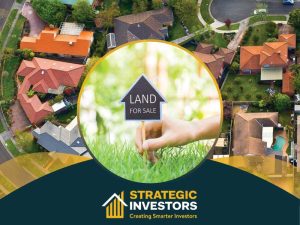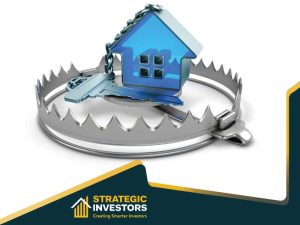
Before you start investing in property, you need to think about the kind of property you wish to buy.
What type of property is the best investment?
Different types of properties have varying advantages and disadvantages.
Vacant Land as a Property Investment?
 Let’s first consider vacant land. People purchase blocks of land in the hope its value will increase enough to cover the cost of holding the land, interest rates etc., and provide a sufficient return on the amount of money invested, knowing there is no regular income from a vacant block.
Let’s first consider vacant land. People purchase blocks of land in the hope its value will increase enough to cover the cost of holding the land, interest rates etc., and provide a sufficient return on the amount of money invested, knowing there is no regular income from a vacant block.
Some people have made lots of money purchasing large tracts of land on the urban fringes of major cities. As the fringes of suburbia have expanded, they’ve been able to sell their land, and the price escalation of the land can be huge. Successful land speculation needs much investigation and analysis.
Be aware of the risks
Investors need to know the growth trends in the community in which they are considering purchasing. They also need to know how quickly they will be spending on infrastructure. Considered land speculation can be very profitable. But you must also be aware of the risks.
The risks of land purchases
 If you buy a large area of land on the urban fringes, you’re taking a gamble that the city’s growth will continue, and it will reach your purchase in the near future. You’re also gambling that the government will not change its infrastructure plans or zoning for the area. A further downside to investing in vacant land is that it doesn’t provide any regular income. With a typical income-producing property, you would expect a gross rental return of anywhere from 5% to 10% per annum. If you invest in vacant land, you need to make significant capital growth to match the returns of an income-producing property.
If you buy a large area of land on the urban fringes, you’re taking a gamble that the city’s growth will continue, and it will reach your purchase in the near future. You’re also gambling that the government will not change its infrastructure plans or zoning for the area. A further downside to investing in vacant land is that it doesn’t provide any regular income. With a typical income-producing property, you would expect a gross rental return of anywhere from 5% to 10% per annum. If you invest in vacant land, you need to make significant capital growth to match the returns of an income-producing property.
An additional negative to consider if thinking about buying vacant land is the lack of finance that is typically available. Many lenders are reluctant to lend on a property that doesn’t produce income. Consequently, they may only lend up to 60% of the value. This is considerably less than can be secured on income-producing property. Another type of property you could consider investing in is commercial property. This encompasses a wide variety of properties that aren’t classified as residential, including offices, retail, and industrial properties and hotels.
Commercial Property as an Investment
 Commercial property usually achieves a higher rental yield than residential property. It also has the added advantage of generally being a net return to the owner. The tenant generally pays the outgoings on the property, such as rates, taxes and rent. Commercial property also receives the same tax benefits as residential property.
Commercial property usually achieves a higher rental yield than residential property. It also has the added advantage of generally being a net return to the owner. The tenant generally pays the outgoings on the property, such as rates, taxes and rent. Commercial property also receives the same tax benefits as residential property.
Potential Risks of Commercial Investments
 However, there are several downsides to commercial property. Firstly, the risk, your property could be vacant for some time is greater than that of residential property. Commercial property is often designed and constructed to be used as specified for your tenant. If the property becomes vacant, it may take many months or even years to find the right tenant again. Residential property is usually rented again when a tenant moves on within a short period of time, even if the economy is in recession.
However, there are several downsides to commercial property. Firstly, the risk, your property could be vacant for some time is greater than that of residential property. Commercial property is often designed and constructed to be used as specified for your tenant. If the property becomes vacant, it may take many months or even years to find the right tenant again. Residential property is usually rented again when a tenant moves on within a short period of time, even if the economy is in recession.
Another less desirable aspect of commercial property is the amount of leverage available compared to residential property. Although you may get financed on residential property of 80%, or even higher on commercial property, the maximum financial institutions will usually lend is around 70%.
Residential Property Investment as an Option
 Bet’s now consider investing in residential property. To start with, the risk of vacancy is low compared with that of commercial property. And has several benefits over other types of property. Even if the residential vacancy rate moves higher, it is still much easier to get tenants for the residential property than a commercial property.
Bet’s now consider investing in residential property. To start with, the risk of vacancy is low compared with that of commercial property. And has several benefits over other types of property. Even if the residential vacancy rate moves higher, it is still much easier to get tenants for the residential property than a commercial property.
Residential property also has the added benefit of attracting a high level of finance. Lenders love the residential security property provides and will often lend to 90% or more of the value. While residential property provides better income than vacant land, which provides no income, the income from a residential property is usually less than that provided by commercial properties. However, it would help if you also kept in mind that the government is determined to keep housing prices from falling too far, which is an essential factor that reduces the risk associated with residential property investment.
Preferred Property Investment types
For most investors, residential property is probably the best investment when starting a property investment career. The lower risk of vacancy and the improved availability to leverage gives the average Australian investor enough opportunity to get established as a property investor without incurring excessive risk.













